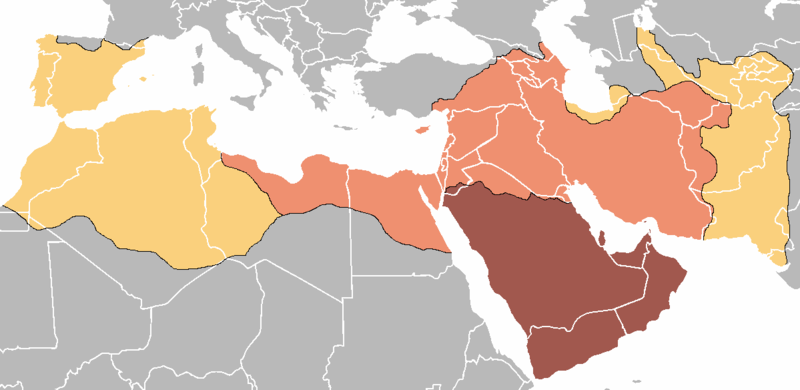Friday, March 6, 2009
Footprints in the Sand
One night I dreamed I was walking along the beach with the Lord.
Many scenes from my life flashed across the sky.
In each scene I noticed footprints in the sand.
Sometimes there were two sets of footprints,
other times there were one set of footprints.
This bothered me because I noticed
that during the low periods of my life,
when I was suffering from
anguish, sorrow or defeat,
I could see only one set of footprints.
So I said to the Lord,
"You promised me Lord,
that if I followed you,
you would walk with me always.
But I have noticed that during
the most trying periods of my life
there have only been one
set of footprints in the sand.
Why, when I needed you most,
you have not been there for me?"
The Lord replied,
"The times when you have
seen only one set of footprints in the sand,
is when I carried you."
Mary Stevenson
Wednesday, March 4, 2009
Islamic empire
Ibn Seena
Avicenna
From Wikipedia, the free encyclopedia
Abū ‘Alī al-Ḥusayn ibn ‘Abd Allāh ibn Sīnā Balkhi', known as Abu Ali Sina Balkhi[3][4] (Persian: ابوعلی سینا بلخى) or Ibn Sina (Persian: ابن سینا) and commonly known in English by his Latinized name Avicenna (Greek: Aβιτζιανός, Abitzianos),[5] (born c. 980 near Bukhara, contemporary Uzbekistan, died 1037 in Hamedan in modern Iran) was a Persian[6] polymath and the foremost[7] physician and philosopher of his time. He was also an astronomer, chemist, geologist, logician, paleontologist, mathematician, physicist, poet, psychologist, scientist, and teacher. [8]
Ibn Sīnā wrote almost 450 treatises on a wide range of subjects, of which around 240 have survived. In particular, 150 of his surviving treatises concentrate on philosophy and 40 of them concentrate on medicine.[9][10] His most famous works are The Book of Healing, a vast philosophical and scientific encyclopaedia, and The Canon of Medicine,[1] which was a standard medical text at many medieval universities.[11] The Canon of Medicine was used as a text-book in the universities of Montpellier and Louvain as late as 1650.[12] Ibn Sīnā developed a medical system that combined his own personal experience with that of Islamic medicine, the medical system of the Greek physician Galen,[13] Aristotelian metaphysics[14] (Avicenna was one of the main interpreters of Aristotle)[15], and ancient Persian, Mesopotamian and Indian medicine. He was also the founder of Avicennian logic and the philosophical school of Avicennism, which were influential among both Muslim and Scholastic thinkers.
Ibn Sīnā is regarded as a father of early modern medicine,[16][17] and clinical pharmacology[18] particularly for his introduction of systematic experimentation and quantification into the study of physiology,[19] his discovery of the contagious nature of infectious diseases,[20] the introduction of quarantine to limit the spread of contagious diseases, the introduction of experimental medicine, evidence-based medicine, clinical trials,[21] randomized controlled trials,[22][23] efficacy tests,[24][25] clinical pharmacology,[24] neuropsychiatry,[26] risk factor analysis, and the idea of a syndrome,[27] and the importance of dietetics and the influence of climate and environment on health.[28] He is also considered the father of the fundamental concept of momentum in physics,[29] and regarded as a pioneer of aromatherapy for his invention of steam distillation and extraction of essential oils.[30] He also developed the concept of uniformitarianism and law of superposition in geology.[31]
George Sarton, an author of the history of science, wrote in the Introduction to the History of Science:
"One of the most famous exponents of Muslim universalism and an eminent figure in Islamic learning was Ibn Sina, known in the West as Avicenna (981-1037). For a thousand years he has retained his original renown as one of the greatest thinkers and medical scholars in history. His most important medical works are the Qanun (Canon) and a treatise on Cardiac drugs. The 'Qanun fi-l-Tibb' is an immense encyclopedia of medicine. It contains some of the most illuminating thoughts pertaining to distinction of mediastinitis from pleurisy; contagious nature of phthisis; distribution of diseases by water and soil; careful description of skin troubles; of sexual diseases and perversions; of nervous ailments."[20]




